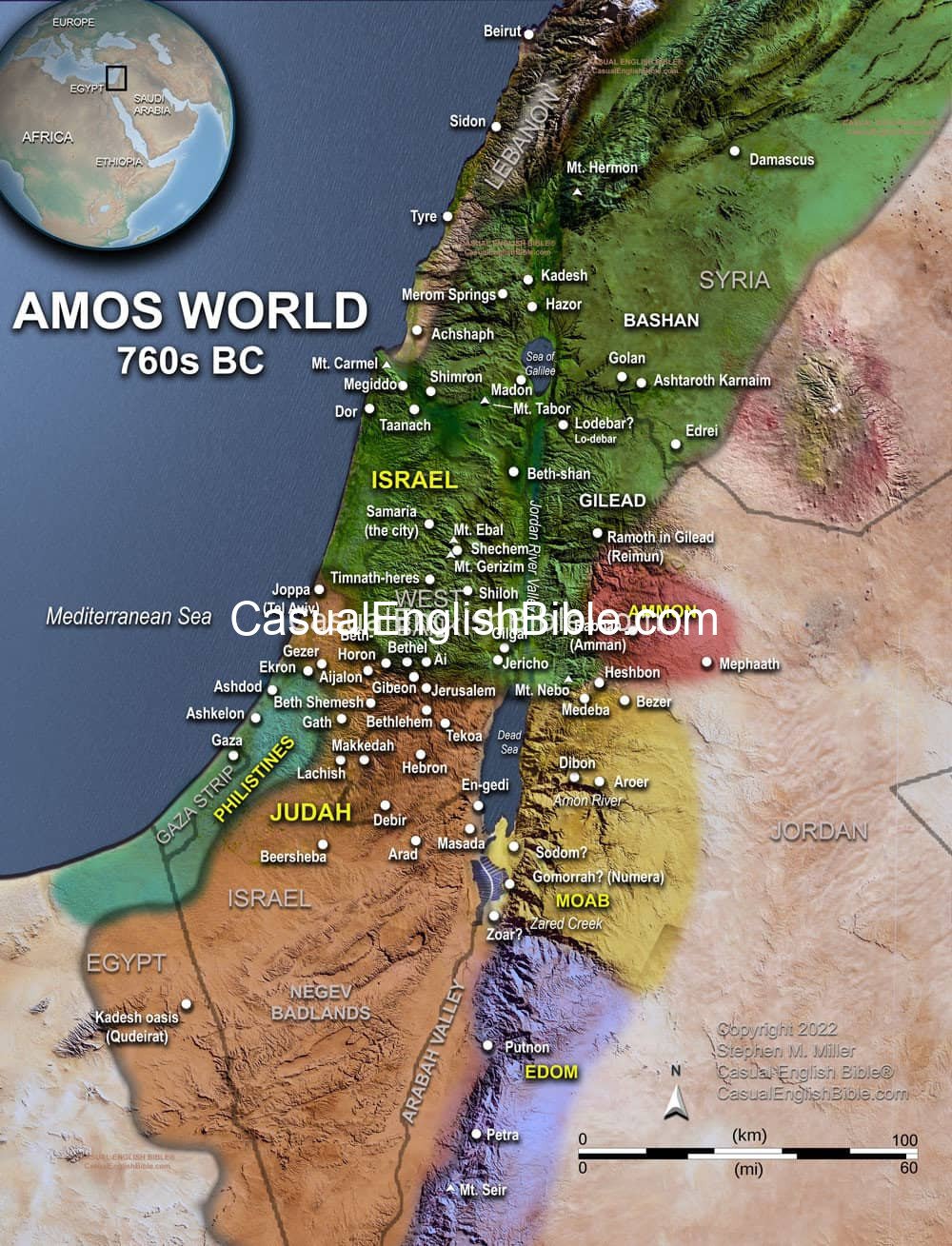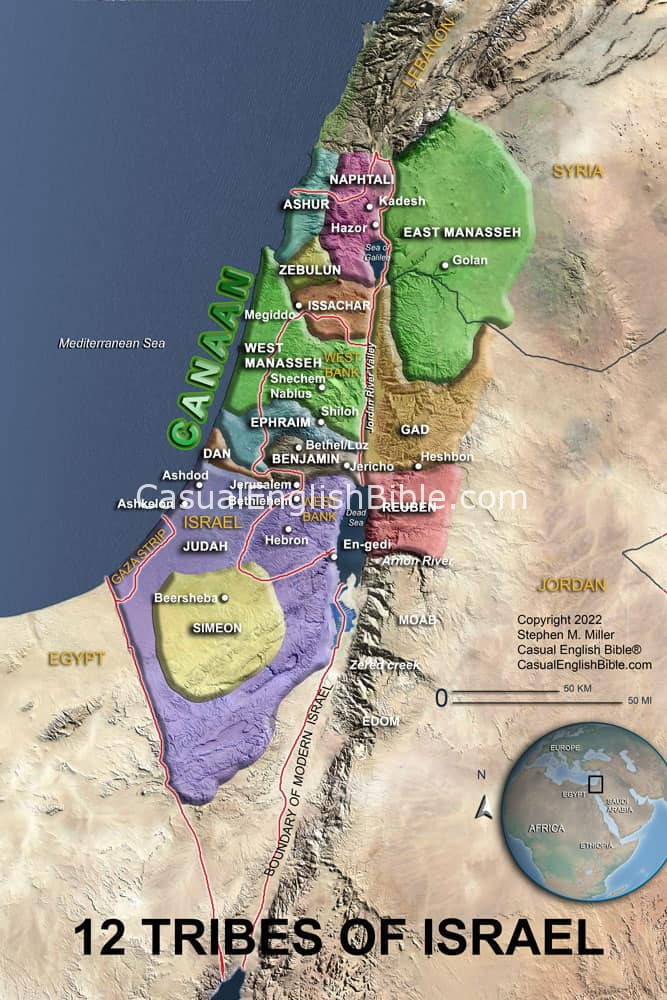Amos 5
Sad song for sinning Israel
Israel will fall and won’t get up
1Israel, I have a dreadful message [1] for you.And I’m going deliver it loud and clear.
2Israel the innocent virgin has fallen
And she’ll never get back on her feet.
She lies helpless in the dirt of her land,
With no one to help her up.
3Here’s what the LORD God says:
When a city sends out an army of 1,000,
Only 100 will survive.
When a city sends 100,
Only 10 will live.
4The LORD says this to the people of Israel:
Come back to me and you’ll live.
5Stop looking for me at Bethel. [2]
Don’t look for me at Gilgal.
I’m not at Beersheba, [3] either.
People at Gilgal will go forced into exile.
But those in Bethel will die.
6Come back to the LORD.
So he doesn’t have to rain fire on Joseph’s family, [4]
And burn Bethel in flames no one can put out.
You know nothing about justice
7You poison justice,Knocking good people off their feet.
8There’s a name for the one who made them,
the constellations Pleiades and Orion.
He transforms the night to light,
From darkness into morning dawn.
He calls for water he made for the sea
And pours it onto the earth.
His name is LORD. [5]
9He hammers walled cities with destruction
And pounds them into crumbling ruin.
10These people hate honest judges
Dispensing justice at the city gates.
They detest honesty and honest people.
11So, because you tax the poor into the ground,
Robbing them of grain they need for food,
Here’s what’s going to happen to you.
You built expensive homes from hand-cut stone,
But you won’t live in them.
You planted beautiful vineyards on your land
But you won’t drink the wine.
12I know everything you’ve done wrong.
I can count every time,
And I can weigh the damage.
I’m talking to you who hurt good people.
You’ll do anything for a bribe,
And throw justice with good people out like trash.
13In times like this
Many people lay low and stay quiet.
They won’t say a thing.
For they know evil rules their world.
Oppose evil, fight for goodness
14If you want to enjoy lifeChase the good instead of the bad.
That way, you’ll have good company,
The LORD of everyone.
15Take a stand against evil,
Embrace what’s good,
And fight for justice.
If you can do that,
Maybe the LORD will be kind
To those in Joseph’s family
Who survive the coming storm.
When mourning breaks
16This is what the LORD says,The LORD of everyone:
Crying people will fill the cities.
They’ll scream, “No! No!”
They’ll call on hired farm hands
To help mourn the losses,
And join the cries of experienced mourners. [6]
17Even out in the vineyards people will cry.
I’m coming to you, says the LORD,
And I’ll pass right through you when I do. [7]
Dark Judgment Day of the LORD
18So, you want the Day of the LORD [8] to come.Why would you want that?
Seriously, you want the Day of the LORD?
It’s going to be a dark day,
No sunshine breaking through.
19No way to escape.
Escape will be like running from a lion
Into the claws of a bear,
Or resting your hand against a wall
Into the fangs of a snake.
20This Day of the LORD
Takes you to place of darkness,
Where there’s no light at all,
To a place of despair,
Without a ray of hope.
Religious rituals aren’t enough
21Your religious celebrations disgust me.There’s nothing there for me.
22You sacrifice your burnt offerings [9]
And you bring me your grain, as well.
But I’ll reject them both.
I won’t accept your peace offerings, [10] either,
With the premium livestock you bring.
You sacrifice to me, but I won’t even look.
Let justice roll like a river
24Let justice roll through you like a river,With goodness like a stream that never runs dry. [11]
25Don’t you remember those 40 years in the desert?
Remember, I didn’t ask you to bring offerings? [12]
26You lift [13] your idols in a procession,
Sky gods Sikkuth and Kiyyun, [14]
Handmade by your own hands.
27Well, I’ll point your procession to Damascus
And send you from there into exile.
That’s the message of the LORD,
God of everyone, everywhere.
Footnotes
Amos follows the ancient style of a funeral song, a dirge. He mourns the death of unidentified people who serve as symbols of Israel—a nation headed for elimination from the world map. Assyrian invaders will defeat Israel in 722 BC and deport Jewish survivors of the battles into what is now Iraq.
Bethel and Gilgal were the main worship areas in the northern Jewish nation of Israel. Jewish law, however, required them to worship only in Jerusalem. Moses warned the people that once they arrived in their future homeland, they were to worship in only one central location: “The LORD your God will choose one worship center for the entire nation of Israel. That’s where all your tribes will come to worship” (Deuteronomy 12:5). Jerusalem became that site, in Judah’s tribal territory along the border with Benjamin’s tribe (2 Chronicles 6:6). Northern rulers of Israel didn’t want their people returning to Jerusalem to worship. They feared reunification under one king from David’s descendants. And it wouldn’t be them.
Some say “Beersheba” reads like a late addon by some editor. Beersheba wasn’t in the northern nation of Israel. It was in the southern nation of Judah, south of Amos’ home in Tekoa. The addition of this city into the poetry messes up the staccato cadence, or meter. And Amos skips telling us what will happen to the city. But some scholars speculate that people in Israel may have traveled there to worship at the home of Abraham, father of the Jewish people.
“Joseph’s family” or descendants is another name for the northern Jewish nation of Israel. Joseph seems to have been Jacob’s favorite son. Joseph had two sons, Ephraim, and Manasseh. Each family grew into a tribe. So, technically, those two tribes were the only descendants of Joseph. Both tribes were in Israel.
Moses asked God what his name was, and God said Moses should tell the Israelite ancestors of the Jews that his name is “I AM” (Exodus 3:14). In the original Hebrew language, the name is spelled with only consonants—no vowels. It’s an ancient shorthand, to save hides used to make scrolls. The name is YHWH. Without knowing which vowels, most scholars have settled on YAHWEH, pronounced YAH-way. Most English Bibles translate that name as LORD in all capital letters. “Lord” in lower case letters means “master.” God’s name is so sacred to many Jews that they refuse to speak it. Instead, they’ll use names that describe the character of God, such as El Shaddai or Adonai, which means “my Lord.” Many won’t even write the name. In English, they’ll spell the name G-d.
These may be hired mourners. People in ancient times often hired mourners the way we hire musicians and ministers to help us honor the lives of our loved ones.
The Hebrew term for “pass through” can describe what a sharp sword does to flesh and bone. But this may also be a reference to the first Passover, when the LORD’s messenger—perhaps the LORD himself—passed through Egypt and took the lives of all the people born first in their families. This was the tenth and final plague, which convinced Egypt’s king to free Moses and the Hebrew ancestors of today’s Jewish people. This comparison in Amos paints Israel as the new version of an ancient and evil Egypt (Exodus 12:12).
Bible writers talk about a “day of the LORD” or “on that day” or “day of visitation” or “there’s a time coming.” It’s a day that can go in one of two directions. It can be a good day—a day God comes to save his people. It’s something to look forward to. Some scholars trace the idea back to what happened when God came to Egypt and with 10 plagues, he freed the Israelites. But it can also be a fearful day to people at odds with God. To them, it is Judgment Day. But to people on good terms with God, his arrival for Judgment Day or any other reason is welcome. The prophet Joel describes it in graphic terms as a terrible day when invaders destroy sinful Jerusalem (Joel 1:15; 2:11). Obadiah uses the phrase that way as well. But to God’s people, the “day” is the day of salvation (Joel 2:32).
This was the most common animal sacrifice. Worshipers burned the entire animal. See Leviticus 1.
A peace offering, described in Leviticus 3, is one of several prescribed offerings in Jewish tradition. When Jewish people wanted to give thanks to God for something, such as good health or safety, they would sacrifice a sheep, goat, cow, or bull. They would burn part of the animal, including the kidneys and fat covering the intestines. They would eat the rest in celebration, often with family and friends. It takes a fair number of hungry people to eat a cow. But people were eager to eat meat because it was rare in Bible times for common folks to eat meat, many Bible scholars say.
Israel and Judah had a lot of part-time streams that came and went with the rainy season of winter and with the springtime rains. Locals today call them “wadis.” Amos says God is demanding something more than occasional justice. He wants justice as constant as a river that runs high and hard every day of the year.
In a time and place where livestock and grain were scarce, the Hebrew ancestors of today’s Jewish people didn’t have to follow the sacrificial laws religiously. Moses set them up, like many other laws, for use once the people became established in the land.
The Hebrew word here for lift is nasa. A fine acronym for a space agency.
Scholars are left guessing about what to do with this verse. One guess among Jewish scholars is that Sikkuth (or Sakkuth) refers to a regional god of the sky, Shikutz. The guess is that Amos used that god because its name sounds so much like the Hebrew word for disgusting, ritually filthy things that aren’t kosher: shikutz. If we look hard enough, we can find the sound of an English word for something disgusting. The etymology of that English word, which some might say when they hear a police siren directing them to pull over, doesn’t go back into the Hebrew. But the sound does.
Discussion Questions
- Sorry, there are currently no questions for this chapter.









